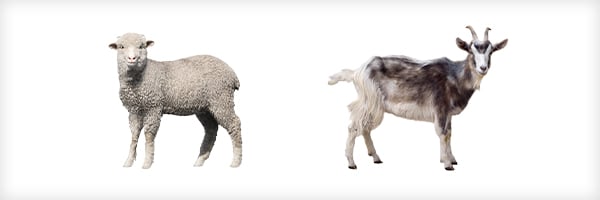Doesn’t God like goats? When God separates the sheep and the goats, you won’t want to be a goat! What does the parable of the sheep and the goats mean?

Jesus' parable about sheep and goats is really about people and the choices of our hearts.
At the end of His Olivet Prophecy, Jesus gave three parables about how to live now to prepare for His Kingdom.
The third one could almost convince you that God—who created all creatures—doesn’t like goats.
“When the Son of Man comes in His glory, and all the holy angels with Him, then He will sit on the throne of His glory. All the nations will be gathered before Him, and He will separate them one from another, as a shepherd divides his sheep from the goats. …
“Then He will also say to those on the left hand [the goats], ‘Depart from Me, you cursed, into the everlasting fire prepared for the devil and his angels’” (Matthew 25:31-32, 41).
This “everlasting punishment” is the opposite of “eternal life” (verse 46). To understand what the Bible means—and doesn’t mean—by this, see our online articles “Eternal Torment?” and “What Is the Punishment of the Wicked?”
But however you take it, everyone would agree the outcome for the goats is not good!
Why goats?
Jesus didn’t spell out exactly why the goats were the bad guys in this parable, but many have speculated.
Here is what Adam Clarke said in his commentary: “Sheep, which have ever been considered as the emblems of mildness, simplicity, patience and usefulness, represent here the genuine disciples of Christ. Goats, which are naturally quarrelsome, lascivious, and excessively ill-scented, were considered the symbols of riotous, profane, and impure men.”
What did Jesus mean by His parable of the sheep and the goats?
Be sure to read my wife’s shepherding experience in the sidebar “My Personal Experience With Sheep and Goats.”
A parable about people
But of course the lesson of the parable has little to do with actual sheep and goats, whose behavior is based on instinct. Nor is it really a statement of whether sheep are good and goats are bad.
Jesus was using the general differences in their natures to teach an important lesson about the way He sees people: He observes our behavior and will judge the choices of our hearts.
The context of the parable of the sheep and the goats
Jesus’ prophecy started in answer to the disciples’ questions: “Tell us, when will these things be? And what will be the sign of Your coming, and of the end of the age?” (Matthew 24:3). The rest of chapter 24 gives details about what will happen before His second coming to earth to save humanity from self-destruction. Read more about it in our Life, Hope & Truth article “Understanding the Olivet Prophecy.”
Christ’s return and the establishment of His perfect government is the only solution to this world’s spiraling descent into evil and disaster.
Then chapter 25 continues with three parables that tell followers of Christ how to be faithful and wise servants preparing for our Master’s return.
The parable of the wise and foolish virgins demonstrates the importance of always staying close to God and always being prepared for His coming. The parable of the talents shows the necessity of diligently doing the work God gives us to do and growing spiritually.
Then comes the parable of the sheep and the goats, highlighting the underlying motivation we must have. True followers of Jesus Christ will be growing in self-sacrificing love.
The lesson for us from the parable
The messages to the righteous sheep and to the selfish goats are basically opposites. Jesus gave the same checklist of human needs, and the difference was that the sheep fulfilled these needs for others while the goats did not.
“Then the King will say to those on His right hand [the sheep], ‘Come, you blessed of My Father, inherit the kingdom prepared for you from the foundation of the world: for I was hungry and you gave Me food; I was thirsty and you gave Me drink; I was a stranger and you took Me in; I was naked and you clothed Me; I was sick and you visited Me; I was in prison and you came to Me’” (Matthew 25:34-36).
Of course the sheep were confused by this. They knew they hadn’t done any of these things for the King.
“And the King will answer and say to them, ‘Assuredly, I say to you, inasmuch as you did it to one of the least of these My brethren, you did it to Me’” (verse 40).
If we are to be the blessed sheep, not the cursed goats, we must recognize the needs of others and work to fill them. We must strive to treat everyone we meet as if we were serving Christ Himself.
If we are to be the blessed sheep, not the cursed goats, we must recognize the needs of others and work to fill them. We must strive to treat everyone we meet as if we were serving Christ Himself. And we must do it till it becomes so natural, we don’t even realize we are doing it!
Christ is looking for service motivated by compassion, rather than service done for show. He wants us to give to those who can do nothing for us in return (Luke 6:32-36). John asks, if we can’t love people we have seen, how can we truly love God, whom we have not seen (1 John 4:20)?
The goats might see someone in need of food and clothing and say, “Depart in peace, be warmed and filled” (James 2:16). But a righteous sheep will follow the example of Jesus, who, even though He was so busy He “did not even have time to eat,” was moved with compassion for the crowd (Mark 6:31, 34). He then fed them both spiritually with His teaching and physically by multiplying the five loaves and two fish (verses 35-44).
God’s sheep must follow the example of their compassionate Good Shepherd.
That’s a tall order. But living Matthew 25:35-36 is how we learn to follow Jesus Christ’s unselfish, loving example. It’s how we avoid being a self-serving, stubborn goat.
For additional study on this vital subject, see our online article “How to Be a Good Neighbor,” which examines the parable of the Good Samaritan. On the same page, see also our video “What Can We Learn From the Good Samaritan?”
My Personal Experience With Sheep and Goats
By Becky Bennett
I have to confess, I don’t really care for sheep. Growing up, I spent several summers reluctantly shepherding our family’s small flock of sheep, and I found them to be helpless, flighty, impulsive, silly, lemminglike creatures. (Granted, they may not have had the highest opinion of me as a shepherd!)
But the sheep were wonderful compared to the goats! Perhaps it says something about goats that my parents never expected me to herd them. They were carefully contained—staked out to act as lawn mowers, rather than being allowed to graze in the desert like the sheep. Independent, adventurous, stubborn, persistent, voracious and agile, the goats were trouble if they were ever off of their tethers. The smelly billy goat could be downright dangerous!
So, no, if I wasn’t fond of the sheep, I really disliked the goats!
But my mother loved her goats. And I know others who think their goats are just about the sweetest animals around!
Personally, I think there are good reasons Jesus chose goats to represent self-centered, compassionless people. However, I realize neither sheep nor goat characteristics are immediately discernable in the praise and condemnation Jesus gave in His parable in Matthew 25. And since sheep and goats were both accepted as sacrifices in the Old Testament, it may not be good to read too much into Jesus’ use of goats here, but to keep the focus on the attitudes and actions of humans!
Stories of Selfless Service
The Bible, and the modern Church of God, are full of stories of selfless service. Here are just a few biblical stories to think about.
- When two strangers came into Sodom, Lot insisted they come to his home so he could show them hospitality and give them safety (Genesis 19:1-3).
- When a stranger asked for a drink of water, Rebekah said, “Drink, my lord.” Afterward she added, “I will draw water for your camels also, until they have finished drinking” (Genesis 24:18-19). Imagine how much water 10 thirsty camels could drink!
- When evil Jezebel was killing the prophets of God, Ahab’s servant Obadiah “hid one hundred men of the LORD’s prophets, fifty to a cave, and fed them with bread and water” in the midst of a terrible drought (1 Kings 18:13).
- Dorcas “was full of good works and charitable deeds,” making clothes for all the widows (Acts 9:36, 39).
- The author of Hebrews praised those who “had compassion on me in my chains, and joyfully accepted the plundering of your goods” (Hebrews 10:34).





